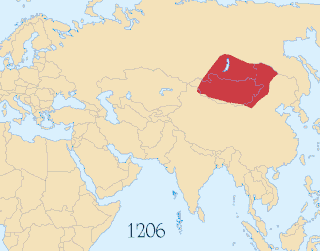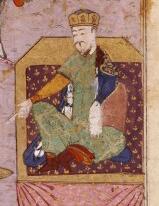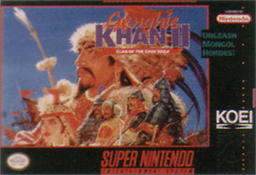Genghis Khan was the founder of the Mongol Empire.
Contents
Genghis may also refer to:
Genghis Khan was the founder of the Mongol Empire.
Genghis may also refer to:
The Conqueror series of novels by Conn Iggulden:

The Mongol Empire of the 13th and 14th centuries was the largest contiguous empire in history. Originating in present-day Mongolia in East Asia, the Mongol Empire at its height stretched from the Sea of Japan to parts of Eastern Europe, extending northward into parts of the Arctic; eastward and southward into parts of the Indian subcontinent, attempted invasions of Southeast Asia, and conquered the Iranian Plateau; and westward as far as the Levant and the Carpathian Mountains.
Kurultai was a political and military council of ancient Mongol and Turkic chiefs and khans. The root of the word is Proto-Mongolic *kura-, *kurija- "to collect, to gather" from which is formed khural meaning "meeting" or "assembly" in Mongolian languages. Khuraldai, khuruldai or khuraldaan means "gathering" or, more literally, "intergatheration". From this same root arises the Mongolian word хурим, which means "feast" and originally referred to large festive gatherings on the steppe but is used mainly in the sense of "wedding" in modern times.

The Pax Mongolica, less often known as Pax Tatarica, is a historiographical term modeled after the original phrase Pax Romana which describes the stabilizing effects of the conquests of the Mongol Empire on the social, cultural and economic life of the inhabitants of the vast Eurasian territory that the Mongols conquered in the 13th and 14th centuries. The term is used to describe the eased communication and commerce the unified administration helped to create and the period of relative peace that followed the Mongols' vast and violent conquests.

Güyük Khan was the third Khagan of the Mongol Empire, the eldest son of Ögedei Khan and a grandson of Genghis Khan. He reigned from 1246 to 1248. He started his military career by participating in the conquest of Eastern Xia and then later in the invasion of Europe. When his father died, he was enthroned as Khagan in 1246. During his almost two year reign, he reversed some of his mother's unpopular edicts and ordered an empire-wide census; he also held some authority in Eastern Europe, appointing Andrey II as the grand prince of Vladimir and giving the princely title of Kiev to Alexander Nevsky.
Chagatai may refer to:
A robot is a virtual or mechanical artificial agent, usually an electro-mechanical machine.
Xanadu may refer to:
A conqueror is a person who conquers.
Genghis Khan, also known as Chinggis Khan, was the founder and ruler of the Mongol Empire.

Yelü Chucai, courtesy name Jinqing, was a Khitan statesman from the imperial clan of the Liao dynasty, who became a vigorous adviser and administrator of the early Mongol Empire in the Confucian tradition. He was the first of Genghis Khan's retainers to formulate policy during the Mongol invasions and conquests, and he also introduced many administrative reforms in North China during the reign of Genghis Khan and his successor Ögedei.
King Khan may refer to:

Genghis Khan II: Clan of the Gray Wolf, originally released as Aoki Ōkami to Shiroki Mejika: Genchou Hishi (蒼き狼と白き牝鹿・元朝秘史), is a 1992 video game developed by Koei. It is part of Koei's Historical Simulation Series of games, and is the sequel to Genghis Khan, though this is the third game in the series. Genghis Khan II was developed and published for MSX2, Nintendo Entertainment System, DOS, X68000, PC-9801, PC-8801, Mega Drive/Genesis, Super NES, Sega CD, PC Engine, and later PlayStation. The Super NES version was also made available on the Wii Virtual Console in North America on June 8, 2009 and in Japan on May 11, 2010.

Jack McIver Weatherford is the former DeWitt Wallace Professor of anthropology at Macalester College in Minnesota. He is best known for his 2004 book, Genghis Khan and the Making of the Modern World. In 2006, he was awarded the Order of the Polar Star, and the Order of Genghis Khan in 2022, Mongolia’s two highest national honors. Moreover, he was honoured with the Order of the Gran Mariscal de Ayacucho by the Government of Bolivia in 2014.
Kublai Khan was a grandson of Genghis Khan, Khagan of the Mongol Empire and founder of the Yuan Dynasty.

The Mongol conquest of China was a series of major military efforts by the Mongol Empire to conquer various empires ruling over China for 74 years (1205–1279). It spanned seven decades in the 13th century and involved the defeat of the Jin dynasty, Western Liao, Western Xia, Tibet, the Dali Kingdom, the Southern Song, and the Eastern Xia. The Mongol Empire under Genghis Khan started the conquest with small-scale raids into Western Xia in 1205 and 1207.
Ananda may refer to:

Genghis Khan, also known as Chinggis Khan, was the founder and first khan of the Mongol Empire. After spending most of his life uniting the Mongol tribes, he launched a series of military campaigns, conquering large parts of China and Central Asia.

The Mongols were highly tolerant of most religions during the early Mongol Empire, and typically sponsored several at the same time. At the time of Genghis Khan in the 13th century, virtually every religion had found converts, from Buddhism to Eastern Christianity and Manichaeanism to Islam. To avoid strife, Genghis Khan set up an institution that ensured complete religious freedom, though he himself was a Tengrist. Under his administration, all religious leaders were exempt from taxation, and from public service. Mongol emperors were known for organizing competitions of religious debates among clerics, and these would draw large audiences.
Temüjin is the birthname of Genghis Khan, the founder of the Mongol Empire.
Chinggis is a transliteration of the traditional Mongolian spelling of Genghis Khan, founder of the Mongol Empire.